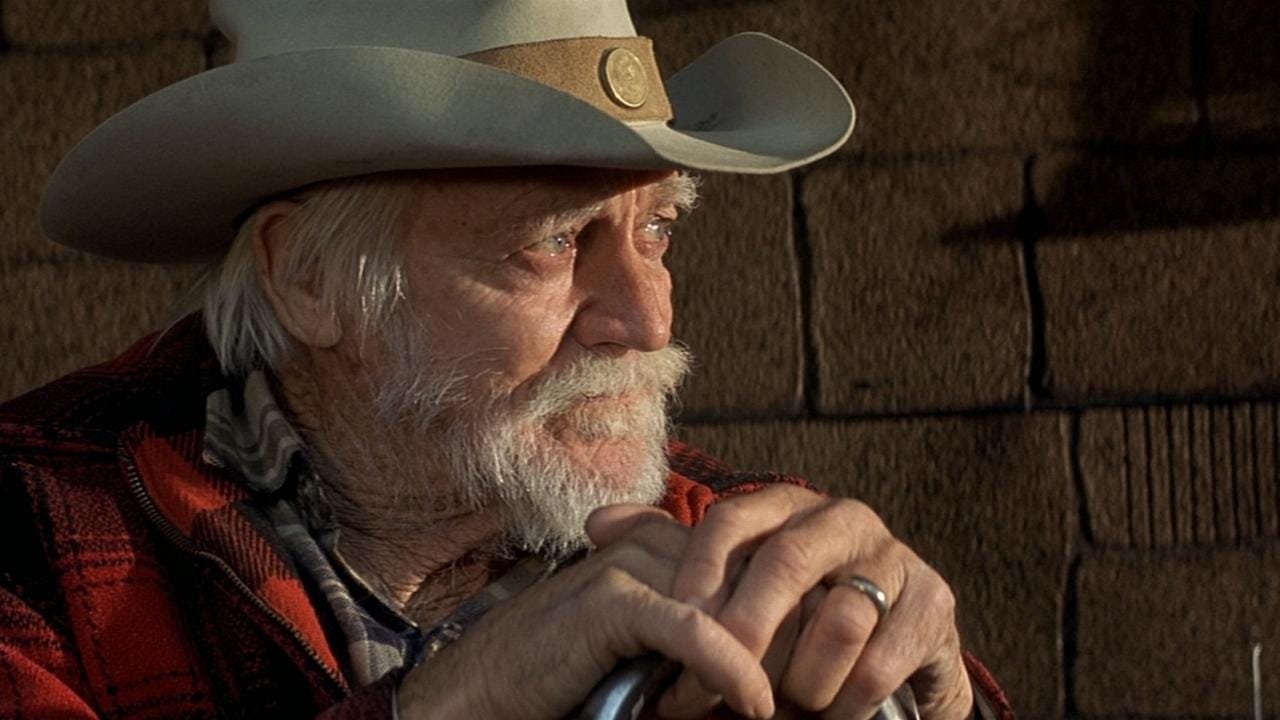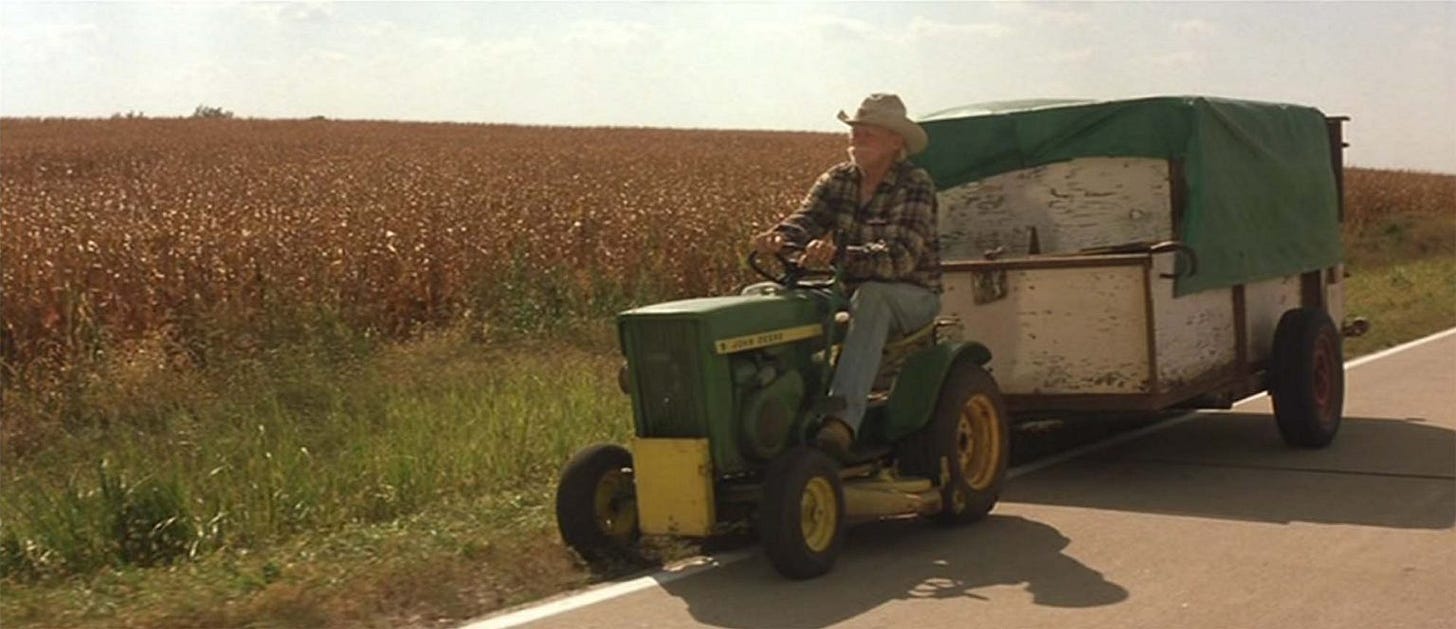The Long Goodbye of David Lynch's 'The Straight Story'
In 1999, Lynch defied expectations with a G-rated Disney movie based on a true story. It wasn't the departure it seemed to be.
“I’ve got to make this trip on my own. I know you understand.” — Alvin Straight, The Straight Story
When David Lynch released The Straight Story in 1999 as a G-rated movie through Walt Disney Pictures, the critical community did a bit of a double take, even though Disney merely acquired the film after its Cannes premiere rather than having the nerve to bankroll it. After all, Lynch had spent the decade provoking and alienating—and, to a certain portion of the moviegoing population, delighting—audiences with one outré shocker after another, starting with the Palme D’Or-winning road movie Wild at Heart and continuing with Twin Peaks: Fire Walk with Me and Lost Highway, two radical works that were only appreciated in retrospect. That’s what tends to happen with many great, original artists, especially the ones who make audiences uncomfortable, but Lynch was going a little further than usual in deconstructing and reconfiguring the dark, dreamlike visions on which he’d built his reputation.
With that in mind, one initial reaction to The Straight Story is to laugh about how, well, straightforward it turned out to be. Not only was Lynch, working from a true story, following an old man’s 240-mile journey from Laurens, Iowa to Mount Zion, Wisconsin atop a riding lawnmower, he shot the scenes in chronological order and didn’t fiddle with the timeline in the completed film, other than the occasional check-in with his hero’s middle-aged daughter. Lynch had made a family movie that Walt Disney Pictures could feel just fine about distributing and that you could take your kids to see, which aside from the original Twin Peaks on ABC, presented an unlikely early gateway into David Lynch. They’d have to gain a little more life experience before catching up with Blue Velvet.
Yet it takes almost no time at all to recognize that The Straight Story is unmistakably a David Lynch film, despite it following the same narrative that attracted quite a bit of press in 1994, when local and national outlets caught wind of this natural lighter-side-of-the-news story. It was really just a matter of when you realized it: The opening titles, set in outer space? The overhead view of Iowa fields that look like a tapestry before Freddie Francis’ camera pulls back far enough to catch a harvester plowing through a row? Or maybe it’s the establishing shot of downtown Laurens, which looks like a typically gone-to-seed Midwestern backwater until a pack of stray dogs comes dashing through the scene?
Those three moments are enough to convince you that no ordinary journeyman is responsible for The Straight Story, but it’s the first sequence that brings home Lynch’s unique fusion of the square and strange. There’s an older woman sunbathing obliviously in the side lawn as the camera creeps toward the outside window of the house next door, where we can hear a body collapse inside. There’s the journey undertaken by another old man from a bar downtown to that same house, because Alvin Straight (Richard Farnsworth) hadn’t shown up for his regular meeting with his buddies. The slow pace at which Alvin is finally discovered is complemented by a deadpan reaction to his predicament: “What are you doing on the floor?” his friend asks incredulously. Only his grown daughter Rose (Sissy Spacek) seems to treat the matter with any sort of urgency.
When Lynch died last week from complications related to emphysema, it was hard not to think of Alvin in The Straight Story, who returns from the doctor with his own emphysema diagnosis and immediately lights up a cigar. He isn’t terribly concerned about his long-term prognosis, for one, and like many people of advancing age, he is stubborn about who he is and what he wants to do.* He refuses to change into a hospital gown for his examination. He refuses all X-rays and tests. He refuses to get a walker when two canes will do. And when he gets back home, he wants to hop on his 1966 riding lawn mower and cut the grass, which surely defies doctor’s orders, too. Once Alvin has his mind set on something, he can’t be talked out of it. That’s also how an artist like Lynch has to think when others are trying to coax him off the creative ledge.
Alvin Straight doesn’t have much time left, but it’s news of his brother Lyle’s stroke that sends him on his journey. He and Lyle have been on the outs for 10 years, though the film doesn’t specify why, other than Alvin referencing some mix of anger, vanity and liquor that must have been potent enough for him to swear off the bottle. Unable to drive due to his poor vision, Alvin rigs a trailer to the back of his mower with essentials—including 15 gallons of gas, water, braunschweiger sausages to roast over the campfire, and a “grabber” he negotiates off the hardware man—and takes off. His buddies don’t think he’ll make it as far as the Grotto shrine 30 miles away in that old heap and they’re right. But he gets a tow back to town, picks up a newer John Deere mower for a few hundred bucks, and tries again.
Of the many subtly audacious touches Lynch brings to The Straight Story, his willingness to calibrate the film’s pace to Alvin’s slow, patient, beautiful journey is perhaps the most crucial. Here’s the story of an old man traversing 240 miles of Heartland terrain over several weeks at five miles-per-hour and it includes this false start, where Alvin has to go all the way back to Laurens and buy another mower. The Straight Story is the polar opposite of an action movie. Yet Lynch’s ability to turn the pace to his advantage leads to perhaps the single best shot in the movie, where the camera starts at road level, with the mower’s front tire rolling over the yellow lines (a favorite Lynch trope), then panning all the way up to the sky and back down again, only to reveal just how short a distance Alvin has gone. You’ve heard of termite art. This is tortoise art.
As Alvin starts to get further along the rural back roads that will lead him across the Mississippi River and across the border to Wisconsin, The Straight Story starts to feel like a Wild at Heart for the Ned Flanders set, a collection of episodic encounters that are mostly friendly but occasionally tip into the surreal. Two scenes in particular are what you might expect from a Lynch film: In one, Alvin witnesses a woman distraught about killing a deer with her car, which is so common an occurrence on her 45-mile commute that she claims to have hit 13 of them. (“Where do they come from?!”) In another, Alvin’s brakes are unable to handle the load as he careens downhill, but as a group of onlookers rush to help him, a team of firefighters is trying to manage a burning house in the background. Not a word is said about the blaze.
Yet Lynch doesn’t aim to unsettle, so much as acknowledge the tension that exists in life between our sometimes chaotic, “strange world” (to put it in Blue Velvet terms) and the one where decency prevails. His attraction to the wholesome, small-town communities in Blue Velvet and Twin Peaks could be hard to read at times, given how much trouble he uncovers beneath their placid surfaces. Are we to believe in rose gardens, white picket fences, and waving firemen with Dalmatians aside their trucks? Or does he mean it as an ironic joke, a deliberately corny picture of America that doesn’t actually exist? Yet over time, it seems like his earnestness could be trusted. He was Agent Cooper, keenly aware of terrible things yet capable of enjoying black coffee, a slice of pie, and friendly conversation. Like Cooper, he seemed to have an intrinsic faith in humanity that evil would fitfully violate.
The Straight Story is Lynch’s most sincere expression of that faith. Alvin meets strangers who are helpful to him, like a family that takes him in for a few days and fixes his broken transmission for a good price. (Alvin negotiates the price down, of course, under the assumption that the twins who did the job spend a chunk of the labor time bickering.) He also offers sage advice, too, to a pregnant runaway that he counsels back into returning home, arguing that the unbreakable bonds of family will win out in the long run. Lynch also gives him time to speak to his experience as a World War II sniper, where his skills with a rifle put him in a position to shoot at Germans who kept getting younger as their ranks were depleted. (“Near the end, we were shooting moon-faced boys,” he laments to a fellow veteran.)
Above all, though, Lynch believes in the integrity of Alvin’s journey and its power as a gesture of humility, redemption, an brotherly love. There would have been plenty of other ways for Alvin to get from Laurens, Iowa to Mount Zion, Wisconsin, despite his meager resources and the difficulty of making arrangements by bus or by car. While he does catch a tow for the last small stretch of road when his mower finally breaks down for good, Alvin insists that he has to go alone and on his own terms. The absurd impracticality and arduousness of his adventure—the stuff of “Can you believe this guy?” media stories—is the olive branch he extends to Lyle in the perfect closing scene. Played by Harry Dean Stanton, Lyle looks out from the porch and then back at his brother, both of their eyes filling with tears.
“You ride that thing all the way out here to see me?”
“I did, Lyle.”
Then the camera turns once again to the stars.
* Before my own father passed away last month after a long stretch in hospice with congestive heart failure, he was about to board his first flight in many years for what would be his final mission: To meet his newborn great-granddaughter. But he was feeling good that day and insisted that my mother wheel him over to get a burger with all the fixings before takeoff. He had to squeeze the most out of his life—and his arteries.
The Reveal’s week-long tribute to David Lynch continues on Friday with a new audio commentary track for Lynch’s 1986 masterpiece Blue Velvet recorded by Scott and Keith. It’s the latest installment of our “Watch Along with The Reveal” series (for paid subscribers only).






Sidenote: I live in Madison, WI, and maybe a month ago, I was at my local beer store, doing what I do best (buying beer). There was a woman in front of me buying some wine and the guy running the cash register said "good to see you again! I watched your movie and I really liked it!" and then they kept chatting. Overhearing the convo, I pieced it together enough to butt in and say "excuse me, are you Mary Sweeney" (long-time editor for Lynch and co-writer of this one) - it was! She was super friendly.
This was beautiful piece, Scott.
Also, do you have grandkid? Or was that one of your siblings? Me still picture entire AV Club diaspora trapped in amber as snarky twentysomethings, until me look in mirror and see how much grey fur me have!